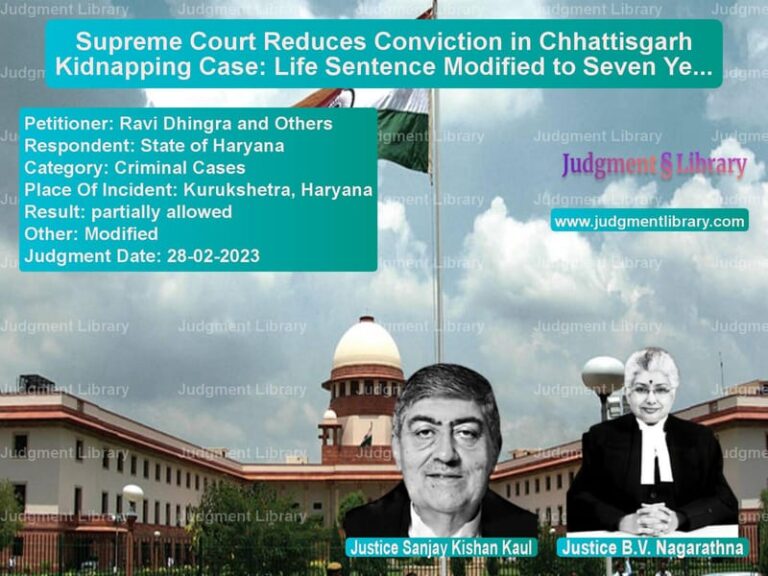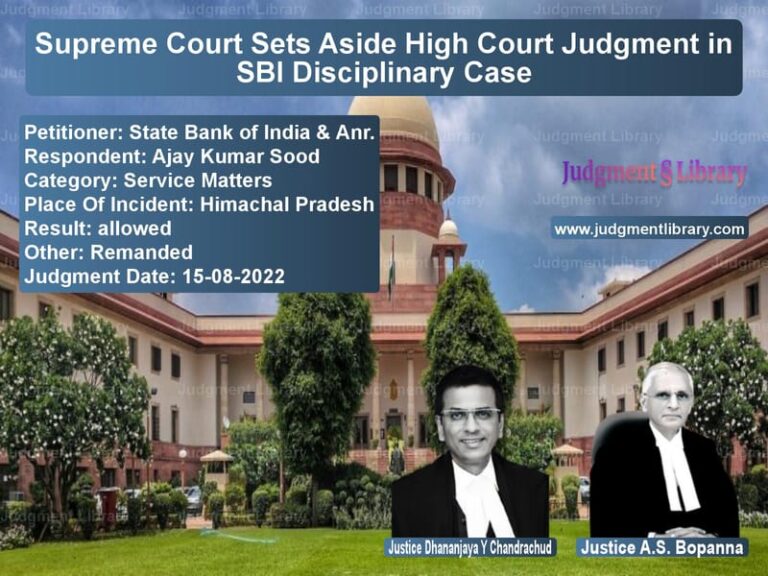PUDA Overcharging Case: Supreme Court Orders Fresh Adjudication on Interest Refund
The Supreme Court of India delivered a critical ruling on the dispute between Jagtar Singh and others against the Punjab Urban Planning and Development Authority (PUDA), now succeeded by Greater Mohali Area Development Authority (GMADA). The case revolved around the excess charges levied by PUDA for the allotment of plots and whether interest should be paid on the refunded amount. The Court ruled that such claims should be resolved through proper adjudication rather than contempt proceedings.
Background of the Case
Jagtar Singh and other allottees had been charged an excessive rate of Rs. 3600 per square yard for plots by PUDA. However, following legal proceedings, the High Court ruled that the appropriate rate should have been Rs. 1400 per square yard. Consequently, PUDA refunded the excess amount collected from the allottees.
The dispute did not end there. The petitioners sought interest on the refunded amount, arguing that since they had paid interest to PUDA during the original payment, they were entitled to receive interest on the excess amount that was later refunded. When PUDA declined to grant interest, the petitioners filed a contempt petition in the High Court.
Arguments of the Petitioner
The petitioners argued that:
- PUDA had charged them interest at 15% per annum on the payments they made for the plots.
- The refund of the excess amount should have included interest at the same rate.
- PUDA had wrongfully enriched itself at the expense of the allottees.
- The High Court had already ruled that the allottees were overcharged, and the logical extension of that ruling should be the refund of interest.
- The failure to refund interest constituted a violation of the principles of fairness and natural justice.
Arguments of the Respondent
PUDA, now represented by GMADA, countered the petitioners’ claims, stating that:
- There was no policy that required PUDA to pay interest on refunded amounts.
- PUDA had complied with the High Court’s directive by refunding the excess amount but was not legally bound to pay interest.
- The matter should not have been raised as a contempt petition but should have been adjudicated separately as a financial dispute.
High Court’s Decision
The High Court ruled in favor of the petitioners and directed PUDA to pay interest at 15% per annum on the refunded amount. The High Court reasoned that PUDA had charged interest at the same rate when collecting payments from allottees, and fairness dictated that the same rate be applied to the refund.
Supreme Court’s Analysis and Judgment
PUDA challenged the High Court’s decision in the Supreme Court, arguing that the issue of interest entitlement had not been adjudicated properly and could not be enforced through contempt proceedings.
The Supreme Court examined the case and stated:
“Normally in a contempt jurisdiction, the Court shall not enter upon adjudication of a dispute. Maybe the applicant in a contempt petition is entitled to some relief, but relief has to be granted after proper adjudication of the dispute.”
The Court held that the contempt petition was not the appropriate forum for deciding whether PUDA was liable to pay interest. Instead, the petitioners should have filed a separate case challenging PUDA’s refusal to pay interest.
Accordingly, the Supreme Court issued the following orders:
- The High Court’s order requiring PUDA to pay interest was set aside.
- The petitioners were granted the liberty to challenge PUDA’s decision before an appropriate legal forum.
- If the petitioners filed such a challenge within one month, it would not be dismissed on the grounds of delay.
- The concerned forum was directed to resolve the matter expeditiously within one year.
Legal Principles Established by the Judgment
The Supreme Court’s decision reinforced several key legal principles:
- Contempt proceedings should not be used to adjudicate substantive financial disputes.
- Disputes over interest entitlements must be resolved through proper legal channels rather than contempt petitions.
- Courts must ensure that adjudication occurs before granting financial relief.
Implications of the Judgment
The ruling has major implications for property buyers, government agencies, and financial disputes in real estate transactions:
- Affirms that interest on refunds should be adjudicated separately rather than enforced through contempt petitions.
- Clarifies that government agencies must act fairly when refunding excess payments.
- Encourages homebuyers and property allottees to seek proper legal recourse for financial claims.
- Sets a precedent for similar disputes where buyers are overcharged and seek interest refunds.
This judgment ensures that government bodies like PUDA and GMADA do not unfairly benefit from delays in refunding excess charges. It reinforces fairness in real estate transactions while ensuring that financial disputes are resolved through proper legal mechanisms.
Don’t miss out on the full details! Download the complete judgment in PDF format below and gain valuable insights instantly!
Download Judgment: Jagtar Singh & Ors. vs The Estate Officer, Supreme Court of India Judgment Dated 19-07-2017.pdf
Direct Downlaod Judgment: Direct downlaod this Judgment
See all petitions in Property Disputes
See all petitions in Damages and Compensation
See all petitions in Consumer Rights
See all petitions in Judgment by Kurian Joseph
See all petitions in Judgment by R. Banumathi
See all petitions in Remanded
See all petitions in Remanded
See all petitions in supreme court of India judgments July 2017
See all petitions in 2017 judgments
See all posts in Civil Cases Category
See all allowed petitions in Civil Cases Category
See all Dismissed petitions in Civil Cases Category
See all partially allowed petitions in Civil Cases Category







